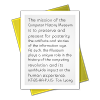Title
Baran, Paul interviewCatalog Number
102740210Type
DocumentDescription
I met Paul Baran shortly after I joined Montgomery Securities, in September 1984, when I made a client solicitation call to Packet Technologies (PT), also known as Packet Cable. Little did I know at the time that lifelong friendships would be formed with Paul Baran, William Houser, and Steve Millard, PT’s founder and Chief Scientist, CEO, and CFO, respectively. Baran’s hyperactively creative mind soon conceived an innovative technology for a high-speed modem that became the basis for a new company, Telebit, launched across Bubb Road from PT. On learning about Telebit, our Venture Fund soon led the investment round and I joined the Board of Directors. My relationship with Baran blossomed and when, years later, I shared with him my idea to write a history book reconstructing the years between 1968 to 1988 for computer communications, he could not have been more encouraging. In addition to this very frank interview, he willingly introduced me to many of the key people whom I interviewed, read early drafts of my work and was always available to answer any questions.Baran is a leading figure in the Arpanet story. After graduating from Drexel University in 1949, he joined the early computer start-up: Eckert-Mauchly Computer Company. He next married Evelyn Murphy, and they left for Los Angeles, where he joined Hughes Aircraft and enrolled in UCLA, earning his Masters in 1959. He then joined RAND Corporation, where he made his seminal contribution to this history by conceiving a communication system based on the use of sending “blocks” as opposed to creating “circuits.” Baran did not use the word “packets” but rather “blocks” or “message-blocks,” leaving it for Donald Davies a few years later to coin the expression “packet-switching” to name this new technology. (See Donald Davies interview)
Paul Baran is as fine a gentleman, as it has been my privilege to know. He essentially became my absent father, and I have no doubts affected others in the same way. He was gracious, humble, caring, compassionate, always willing to lend a helping hand, and believed that the act of innovation was a team effort. I never heard him voice a critical word of anyone. By 1988, his list of successful start-ups includes StrataCom, Telebit, Institute for the Future and Metricom. I am certain there will be more.
This interview provides useful background into why his insight into the importance of packet switching for both “command and control” communications as well as the coming computer communications revolution took years to implement; why he had to write eleven reports known as “On Distributed Communications;” and of how his work relates to Arpanet.
Date
1988-01-12Contributor
| Baran, Paul, Interviewee |
| Pelkey, James L., Interviewer |
Publisher
Computer History MuseumPlace of Publication
Campbell, CAExtent
25 p.Format
PDFCategory
TranscriptionSubject
packet-switching; RAND; Donald Davies; Institute of the FutureCollection Title
James L. Pelkey collection : history of computer communicationsCredit
Gift of James PelkeyLot Number
X5671.2010Related Records
| 102746648 | James L. Pelkey collection : history of computer communications |


